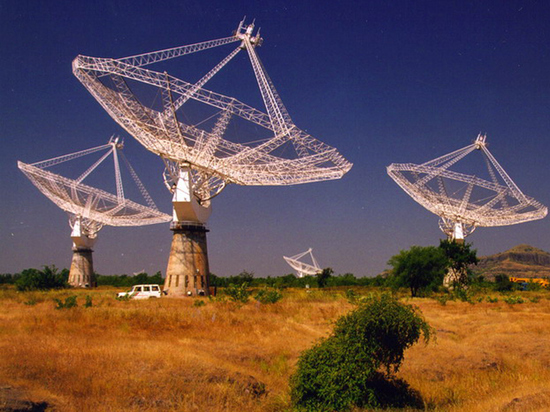Scientists have received a radio signal from another galaxy
[ad_1]

“Hello” from space came from a distance of about 9 billion light years
A radio signal sent from a galaxy nearly nine billion light-years away has been received by scientists on Earth. The discovery could allow astronomers to look back and learn more about the early universe, when it was “only” 4.9 billion years old.
Scientists have recorded a radio signal from a galaxy located almost 9 billion light-years from Earth. According to the Daily Mail, researchers from Canada and India were able to capture a signal from a galaxy called “SDSSJ0826+5630” using a giant telescope in India.
The radio wave could allow astronomers to look into the past and understand the early universe, thought to be about 13.7 billion years old.
“This is the equivalent of looking back in time 8.8 billion years,” Arnab Chakraborty, a cosmologist and co-author of the wave detection study, tells Metro.
As the Daily Mail highlights, the signal received by scientists was not sent by aliens, but instead came from a star-forming galaxy, having been emitted when the universe was only 4.9 billion years old.
This is the first of its kind to detect a radio signal from such a huge distance.
“The galaxy emits different kinds of radio signals,” Arnab Chakraborty tells Metro. “Until now, it has only been possible to pick up such a specific signal from a nearby galaxy, limiting our knowledge to those galaxies closer to Earth.”
The Royal Astronomical Society announced the groundbreaking discovery in their monthly notices.
The detection of the waves was a particularly important discovery because the frequency was at a specific wavelength, known as the “21 cm line”. It is also known as the hydrogen line and is a spectral line of electromagnetic radiation with a frequency of 1420. Hydrogen is distributed throughout space and can help map galaxies. For this, a line 21 cm long is used.
A giant telescope in India was able to pick up a faint signal due to gravitational lensing. The co-author of the study explained to Metro that gravitational lensing was a natural phenomenon that “magnifies the signal from a distant object to help us peer into the early universe.”
Another galaxy distorted the radio signal emitted by SDSSJ0826 +5630, which then amplified the wave and allowed a telescope in India to pick it up.
The researchers used this discovery to measure the atomic mass content of the galaxy. Scientists have found that the mass of this particular galaxy is almost twice the mass of stars visible to us from Earth.
[ad_2]
Source link








